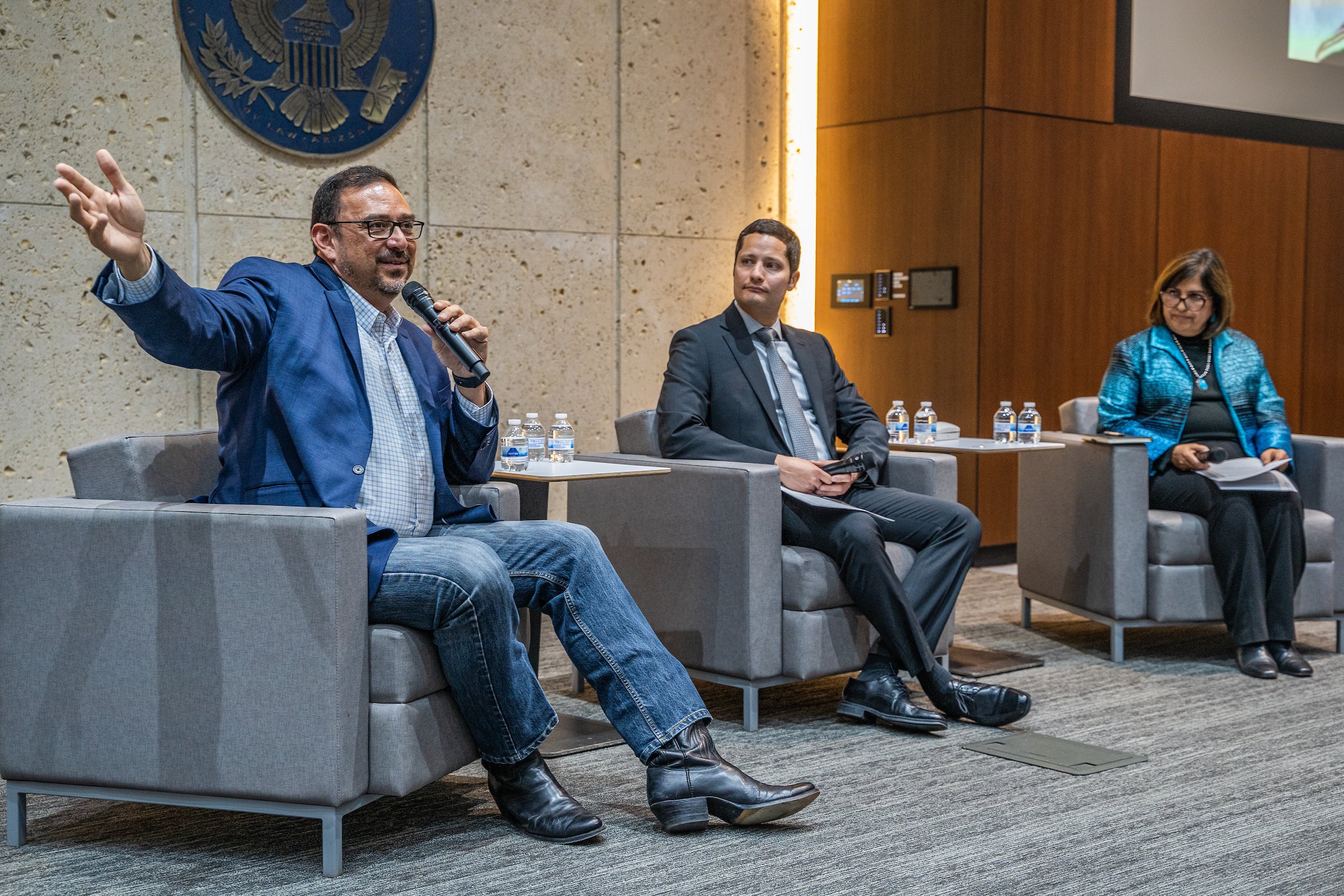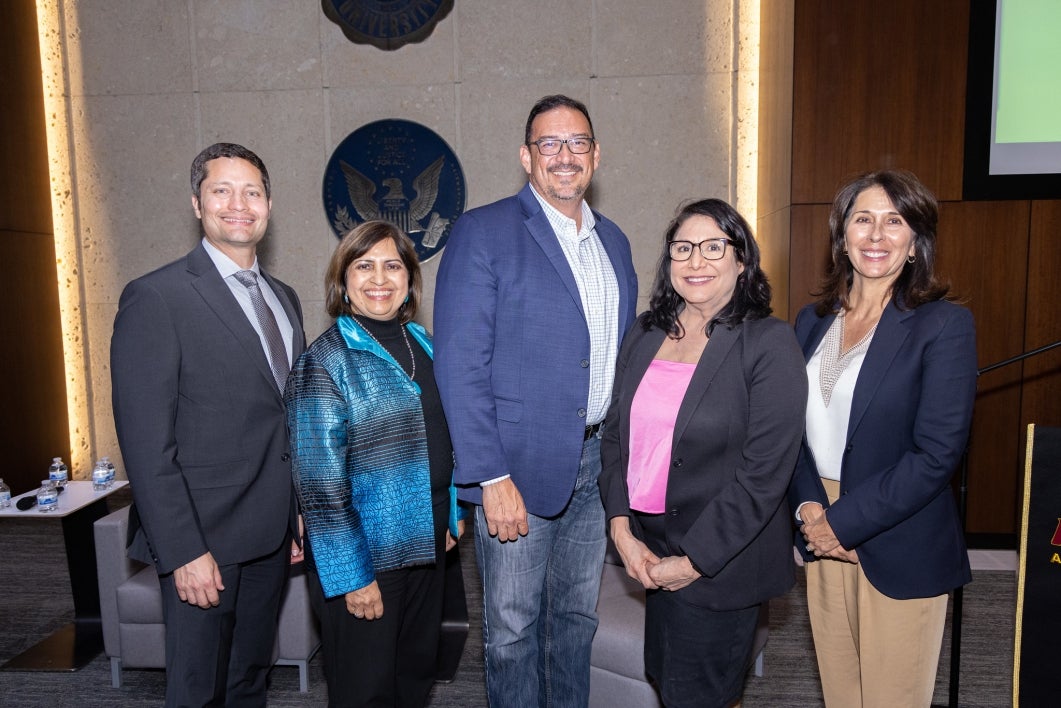Adrian Fontes, Arizona’s 21st secretary of state, joined students, faculty, staff and community members at The College of Liberal Arts and Sciences Thursday evening for a conversation titled “From the Border to the State Capitol.”
Fontes reflected on the impact of growing up in Nogales, Arizona, his journey of service and education, and what he sees for the future of the state of Arizona.
In attendance was Arizona State University Executive Vice President and University Provost Nancy Gonzales, who introduced the secretary.
“I’m honored to join you for this special evening as we welcome Secretary Adrian Fontes back to ASU and to learn more about his life and journey,” Gonzales said.
The Arizona native and ASU alum started the evening by sharing what it was like growing up in a border community.
“Growing up in Nogales is one of the most amazing experiences anybody could have, because sometimes the only way you knew which side of the border you were on was by looking at what flag was flying over the bank that you were closest to. It is the epitome of two worlds in one space,” Fontes said.
As a kid, Fontes said that they would speak English in the classroom and Spanish on the schoolyard. It also wasn’t unusual to go to a friend’s house and hear a grandmother speaking in Greek or Lebanese or Yiddish. He went on to share that it was a place where you were never more than a short walk away from a home where you would be welcome in. It was all about community.
Community is an important theme for Fontes, in his life and career, he said. His journey to service was built from his strong community ties and passion to give back.
Fontes's father was a yardmaster at the Southern Pacific railroad for 41 years; his grandfather also worked on the railroad in Tucson, Arizona, and served as mayor of Nogales for a period of time.
“I still think that the examples that I have from generations ago, or my grandfather or anybody else in a small town, it was about your community, your neighbors. Because the school board was a board that was interested in your neighbors’ kids, kids that we were on the same street with,” he said.
“Service is about giving, it’s about gratitude, it’s about paying back. If you’re lucky enough to be that generous, it comes back again to you.”
Secretary of State Adrian Fontes addresses the audience during his talk “From the Border to the State Capitol.” He was joined on stage by ASU faculty members Kevin Correa and Irasema Coronado. Photo by Alwaleed Alrasbi/Arizona State University
Before attending college, Fontes served active duty in the United States Marine Corps from 1992 to 1996 and was nominated for a meritorious commission, which marks an individual’s outstanding service in the United States Armed Forces.
“One of the things that I learned in the Marine Corps that was more important than anything else was that it was this idea that we're, as a unit in our platoon, our drill instructors would tell us that a chain is only as strong as its weakest link. And so the competition that we had in the platoon wasn't about necessarily being the best, although that was part of the competition, but it was also about being better than not being the worst, not being the guy that broke the chain, not being the link that broke the chain,” Fontes said.
After he left the Marine Corps, Fontes pursued several different programs at ASU but ultimately chose communication, with an emphasis on rhetoric and performance studies, with a long-term goal of becoming a trial lawyer. The ability to communicate well and tell stories connected with his future goals.
“Everything that you look at, everything that you study, all of our courses along the way are about stories. It's history, it's sociology, it's psychology, it's math, it's science, it's engineering; it's how we got to the moon, it's the cellphone in your pocket; it's all storytelling. And so that's what I discovered in the communication department. And when I did my thesis, it was about the journey. It was about a pilgrimage, which in and of itself is mixed in with so many different kinds of stories and storytelling,” he said.
Becoming a storyteller served him well. Fontes said that the exchange of ideas through storytelling is exactly what it means to be a good politician.
When asked what advice he had for students, he encouraged them to never be anything but authentic and true to themselves.
“Make your mistakes now. Have your adventures now. Reach out now. Dare now. Because if you take that straight-and-narrow path to a goal that you think you have in your mind right now, that's not where you're gonna end up,” he said.
“The single most important life lesson that I've learned, and I want all you young people — please, please, please pay attention; if you only pay attention to one thing, pay attention to this — do not compromise.
“It is so much easier to just be yourself and it's so much more fulfilling and gratifying... And if you're at that stage in your life where you just don't know, you're just not really sure who you are, take some time and figure it out. That's why you're in college; that's why you're doing your master's and your PhD. ... But no matter what, just be who you are.”
Fontes also responded to several audience questions during the evening, including what the most pressing issue facing Arizona is in the next election cycle.
“Water. That is the single most important issue. Bar none. We ain't got water (then) we don't have education, we don't have health care, we don't have child care, we don't have jobs, we don't have transportation, we don't have an economy, we don't have manufacturing, we don't have anything if we don't have water. It is literally elemental to the survival of our society, our civilization here in Phoenix. Water is number one.”
Lisa Magaña, associate dean of diversity, equity and inclusion and professor in the School of Transborder Studies, led efforts to bring Fontes to campus for the conversation. Irasema Coronado, director of the School of Transborder Studies, and Kevin Correa, clinical assistant professor and president of ASU’s Chicano/Latino Faculty and Staff Association, joined Fontes for the evening’s conversation.
From left: Kevin Correa, Irasema Coronado, Adrian Fontes, Lisa Magana and Nancy Gonzales joined students, staff, faculty and community members for a conversation titled “From the Border to the State Capitol.” Photo by Meghan Finnerty
Top photo: Arizona Secretary of State Adrian Fontes joined students, faculty, staff and community members at The College of Liberal Arts and Sciences Thursday evening for a conversation titled “From the Border to the State Capitol.” Photo by Meghan Finnerty
More Arts, humanities and education

ASU’s Humanities Institute announces 2024 book award winner
Arizona State University’s Humanities Institute (HI) has announced “The Long Land War: The Global Struggle for Occupancy Rights” (Yale University Press, 2022) by Jo Guldi as the 2024…

Retired admiral who spent decades in public service pursuing a degree in social work at ASU
Editor’s note: This story is part of coverage of ASU’s annual Salute to Service.Cari Thomas wore the uniform of the U.S. Coast Guard for 36 years, protecting and saving lives, serving on ships and…

Finding strength in tradition
Growing up in urban environments presents unique struggles for American Indian families. In these crowded and hectic spaces, cultural traditions can feel distant, and long-held community ties may be…


